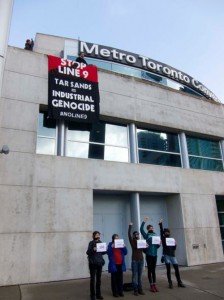
Lyn Adamson, Toronto Media Co-op
NEB Hearings start in Toronto today, here’s what they won’t be hearing.
A banner drop and a series of gaged protestors demonstrated what is being left out of the National Energy Board (NEB) hearings that are taking place this week in Toronto. The subject of the hearings is Enbridge’s Line 9 reversal and expansion proposal, which would allow the company to ship tar sands bitumen from Sarnia to Montreal. Groups today protested the fact that the hearings have explicitly banned discussion of upstream and downstream impacts of the pipeline reversal and expansion, which would allow the tar sands to expand production and refining.
“Stop Line 9: tar sands = industrial genocide” read a large banner that hung from the Metro Convention Centre’s steps. “We want to remind people that Line 9 is one battle of a larger fight against the most destructive project on the planet, which has already transformed an area the size of Florida into what’s termed a ‘sacrifice zone’,” said Vanessa Gray, an Anishnaabe kwe organizer with Aamjiwnaang and Sarnia Against Pipelines. “The tar sands have been termed a ‘slow industrial genocide’ by the native people living downstream, but this term also applies to people living near the refining of this toxic substance. My people are dying from this industry.”
Aamjiwnaang First Nation has 63 chemical refineries within 50 km of the community. Community-monitoring has reported that 40 per cent of the population required inhalers to breath and 39 per cent of women had experienced miscarriages.
Other groups participating in the action highlighted the increased contribution to climate change that Enbridge’s proposal would entail.
“Approving the transport of diluted bitumen means expanding tar sands production which will be a disaster for the planet, said Lyn Adamson Co Chair Canadian Voice of Women for Peace. “These hearings do not replace the need for an environmental assessment. A National Energy Board should be considering alternatives, such as renewable energy and conservation.”
In addition to restricting who could speak at the hearings, the Omnibus Bill C-38 restricted what those individuals could say in the National Energy Board hearing, restricting discussion on tar sands production or refining.
There will be a large rally against Line 9 at the NEB hearings this Saturday, Oct 19 outside the National Energy Board hearings.

